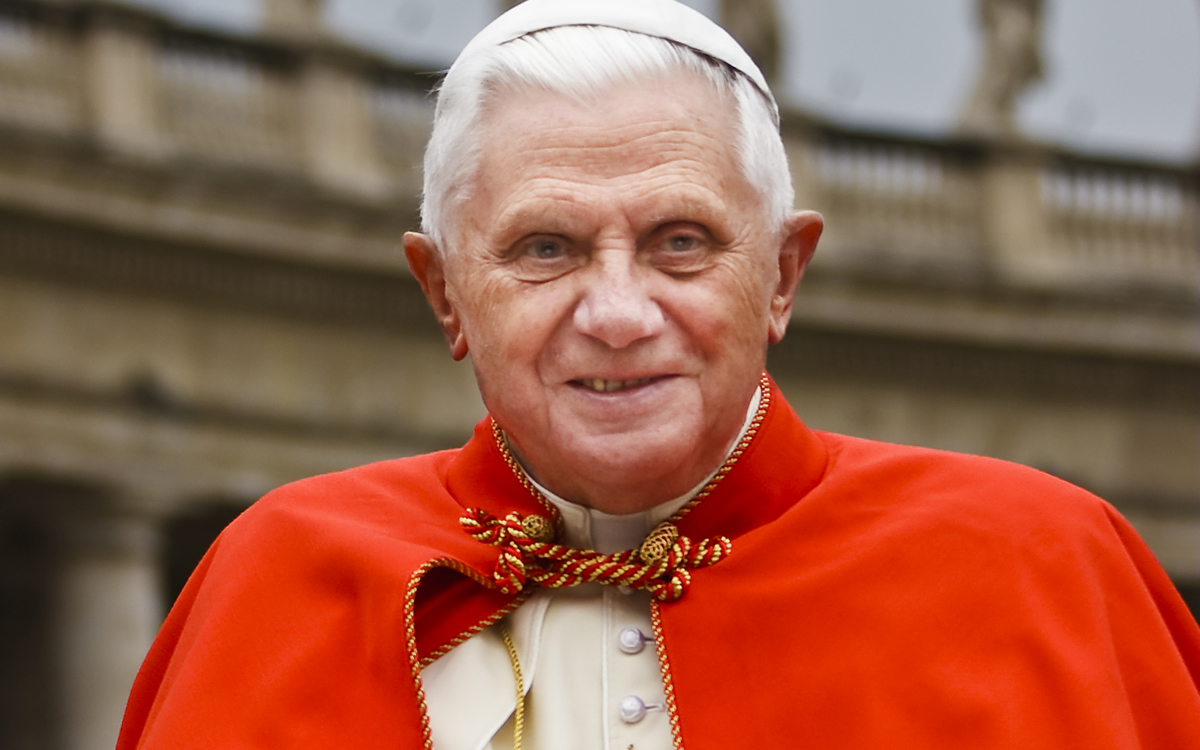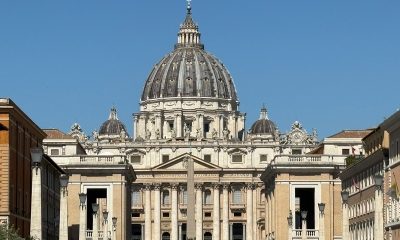Europe
Pope Emeritus Benedict XVI dies at 95
Retired pontiff resigned in 2013

The Vatican on Saturday announced Pope Emeritus Benedict XVI died at the age of 95.
Vatican spokesperson Matteo Bruni said Benedict passed away at 9:34 a.m. local time (3:34 a.m. ET) at the Mater Ecclesiae Monastery in the Vatican.
Benedict was born Joseph Ratzinger in Marktl Am Inn in Germany’s Bavaria state on April 16, 1927.
The Associated Press notes Benedict in his memoirs acknowledged his forced enlistment in the Hitler Youth in 1941 and his desertion from the German army just before the end of World War II.
Benedict and his brother, Georg, in 1951 were ordained as priests. He became Munich’s bishop in 1977 and then-Pope Paul VI in 1980 elevated him cardinal.
Benedict assumed the papacy on April 19, 2005, after Pope John Paul II died. Benedict on Feb. 11, 2013, became the first pope to resign since Pope Gregory XII stepped down from the papacy in 1415. His successor, Pope Francis II, on Wednesday said Benedict was “very ill.”
Benedict described gay men and lesbians as ‘intrinsically disordered’
Benedict as the prefect of the Vatican’s Congregation for the Doctrine of the Faith enforced the Catholic Church’s moral doctrine.
He wrote in a 1986 letter that gay men and lesbians are “intrinsically disordered.” Benedict also said in the same document that gay organizations could no longer use church property.
Benedict described marriage rights for same-sex couples as “a manipulation of nature” and categorized marriage equality efforts around the world as a threat to “human dignity and the future of humanity itself.” Activists during Benedict’s papacy also criticized the Vatican’s opposition to condom use as a way to stop the spread of HIV/AIDS.
Benedict during his papacy faced scathing criticism over his handling of clergy sex abuse in the Catholic Church. The Vatican’s finances also came under scrutiny.
“Benedict’s approach to gay and lesbian issues was clearly hindered by the fact that he did not understand the human dimension of love and relationship that characterizes same-gender couples and individuals,” said Francis DeBernardo, executive director of New Ways Ministry, a Maryland-based organization that ministers to LGBTQ and intersex Catholics, in a statement. “He relied on centuries-old, abstract philosophical and theological ideas instead of learning about more recent understandings of sexuality. Most importantly, he failed to listen to the lived experiences of real people.”
“While clearly a man of faith seeking to act with good intentions; his resistance to engaging the lives, love and faith of actual human beings means he will be remembered as a church leader who did not listen pastorally to those the church serves,” added DeBernardo in his statement. “In contrast, Pope Francis, his successor, has called for pastoral leaders to be listeners and learners, particularly in ministry with those on the margins of church and society, such as LGBTQ+ people.”
Marianne Duddy-Burke, executive director of Dignity USA, an LGBTQ and intersex Catholic organization, in her statement also acknowledged Benedict’s anti-LGBTQ legacy.
“The death of any human being is an occasion of sorrow. We pray for Pope Benedict’s soul and express our condolences to his family, friends and loved ones,” said Duddy-Burke. “However, his death also calls us to reflect honestly on his legacy. Benedict’s leadership in the church, as pope and before that as head of the Vatican’s Congregation for the Doctrine of the Faith (CDF), caused tremendous damage to LGBTQIA+ people and our loved ones. His words and writings forced our community out of Catholic churches, tore families apart, silenced our supporters and even cost lives. He refused to recognize even the most basic human rights for LGBTQIA+ people. Many of us experienced the most harsh and blatant religiously justified discrimination of our lives as a result of his policies.”
The Vatican says Benedict’s body will be in St. Peter’s Basilica on Monday “so the faithful can pay their respects.” His funeral is expected to take place on Jan. 5.
.
European Union
European Parliament resolution backs ‘full recognition of trans women as women’
Non-binding document outlines UN Commission on the Status of Women priorities

The European Parliament on Feb. 12 adopted a transgender-inclusive resolution ahead of next month’s U.N. Commission on the Status of Women meeting.
The resolution, which details the European Union’s priorities ahead of the meeting, specifically calls for “the full recognition of trans women as women.”
“Their inclusion is essential for the effectiveness of any gender-equality and anti-violence policies; call for recognition of and equal access for trans women to protection and support services,” reads the resolution that Erin in the Morning details.
The resolution, which is non-binding, passed by a 340-141 vote margin. Sixty-eight MPs abstained.
The commission will meet in New York from March 10-21.
A sweeping executive order that President Donald Trump signed shortly after he took office for a second time on Jan. 20, 2025, said the federal government’s “official policy” is “there are only two genders, male and female.” The Trump-Vance administration has withdrawn the U.S. from the U.N. LGBTI Core Group, a group of U.N. member states that have pledged to support LGBTQ and intersex rights, and dozens of other U.N. entities.
Russia
Russia’s anti-LGBTQ crackdown takes absurd turn
Authorities targeted one of the country’s largest bookstore chains last month

While MAGA continues to attack LGBTQ rights in the U.S. — including erasing queer history and removing children’s books with LGBTQ characters from libraries and pushing an ever‑broader censorship agenda — and as the UK faces MAGA‑inspired campaigns demanding the removal of LGBT literature from public libraries, Russia’s assault on LGBTQ‑related media has taken an extreme and frankly absurd turn. It is a cautionary tale for Western countries of just how far censorship can go once it becomes normalized. From books to anime, TV shows, and even academia, queer existence is being systematically erased.
In January, one of Russia’s largest private bookstore chains, Chitai‑Gorod-Bukvoed, faced the risk of being shut down over alleged “LGBT propaganda” under a law that prohibits any positive mention of LGBTQ content and equates LGBTQ material with pornography and pedophilia.
Among the books targeted were “Beartown,” “Us Against You,”and “The Winners”by Fredrik Backman, “The Left Hand of Darkness” by Ursula K. Le Guin, and “The Heart’s Invisible Furies” by John Boyne.
According to Chitai‑Gorod-Bukvoed CEO Alexander Brychkin, once it became known in mid‑December that law enforcement agencies had launched inspections, the Chitai‑Gorod–Bukvoed network immediately removed these titles from sale nationwide. In a comment to Kommersant, Brychkin stressed that the chain “operates strictly within the legal framework,” noting that the books were not listed in any official register of banned materials at the time the inspections began and had been on sale for several years.
Previously, two of the biggest online film distribution companies were charged as well under the “LGBT Propaganda law.”
Private businesses had no more right to speak up than writers or artists who are persecuted for their work. This is a nightmare scenario for many Americans who believe the free market itself can protect freedom of expression. This is the reality of modern‑day Russia.
A censored version of the anime “Steins;Gate” has also been released on Russia’s most prominent streaming platform, “Kinopoisk,” in which the storyline of one of the main characters was altered due to the ban on so‑called “LGBT propaganda,” as reported by opposition outlets Verstka and Dozhd, as well as fans on Reddit.
In the original series, the character Ruka Urushibara is a young person with an androgynous appearance who struggles to accept themself in a male body — an obvious indication that Ruka is a transgender girl. Ruka wears women’s clothing and dreams of becoming a girl. In episode eight, Ruka is given the chance to intervene in the past by sending a message to their mother in order to be born female.
In the Kinopoisk version, released in late 2025, Ruka is instead portrayed as a girl living with HIV — something entirely absent from the original anime and invented in translation. The storyline and dialogue were rewritten accordingly, completely distorting the original meaning: in this version, Ruka attempts to change the past in order to be born “healthy,” without HIV, rather than to be born a girl. This is not only absurd, but deeply offensive to the LGBTQ community, which has long been stigmatized in relation to HIV.
A similar distortion appears in “Amediateka”’s translation — or, better to say, rewriting — of the new AMC series “Interview with the Vampire.” Translators rewrote dialogue in ways that fundamentally misrepresented the plot, downplaying the openly queer nature of the characters to the point that romantic partners were translated merely as “friends” or “pals,” rendering entire scenes meaningless. At the same time, even brief critical references to Russian or Soviet politics were removed.
As for queer romance, such as the popular Canadian TV show “Heated Rivalry,”it has no official Russian translation at all and circulates only through fan translations. The show remains popular among millennials and Gen Z, and Russian social media platforms like X (Twitter) and Instagram are full of positive reviews. Yet, in theory, promoting such a show could put someone at risk under the law. People still watch it, still love it, still build fan communities, but it all exists quietly, pushed under the carpet.
The prohibition is not total, but it is a grotesque situation when even such a nice and harmless show is stigmatized.
Books suffer even more. Some classics fall under bans, and books are physically destroyed. In other cases, the outcome is worse: texts are rewritten and censored, as with “Steins;Gate.” This affects not only fiction but also nonfiction. For example, in “Deep Color” by Keith Recker, an American researcher of visual arts, all mentions of queer, feminism or BDSM culture were erased in the Russian edition. Even historically necessary references were removed, including mentions of the pink triangle used by the Nazis.
In the Russian edition of Skye Cleary’s “The Thirst for Authenticity: How Simone de Beauvoir’s Ideas Help You Become Yourself,” dozens of paragraphs were blacked out. Passages discussing the fluidity of gender and a person’s right to define themselves outside the rigid male–female binary were removed. Sections on contraception and abortion, critiques of biological reductionism and social pressure on women, details of Simone de Beauvoir’s intimate life and her relationships with women, as well as reflections on non‑monogamous relationships, were all excised. Even footnotes referencing quotes about gender identity were hidden.
Those two books are one of the many examples of the fate of Russian-translated nonfiction. Actually, even books about animal reproduction were demanded to be censored because of the “LGBT propaganda law”. Apparently, the authorities couldn’t accept a neutral scientific description of same-sex behavior and reproductive diversity in animals.
The authorities know what they are doing. Most people are less likely to read dense nonfiction or search actual studies about animal sexual behavior than to watch a popular TV show about queer hockey players, which makes visual media easier to censor quietly and effectively. So they really could show LGBTQ as something negative and absolutely unnatural for most of the Russian population.
And this is the core of the problem. This is not just censorship of content — it is the rewriting of history, even the narrative around biology. It is the deliberate marginalization of queer existence, the systematic erasure of queer people’s ability to see themselves reflected in culture, literature, and art.
The U.S. still retains independence in academia, publishing, and private business when it comes to queer voices. Russia does not. History shows where this path leads: Nazi Germany burned books; the Taliban destroyed cultural and historical materials. This is always one of the first steps toward genocide — not immediate, perhaps, but inevitable once dehumanization becomes official policy. It never stops with just one group. In Russia, immigrants, people from the North Caucasus and Central Asia, Ukrainians, and even disabled citizens face daily dehumanization — it’s all part of the same system.
And now, alarmingly, the U.S. seems to be following in Russia’s footsteps — the same path that enabled war in Ukraine and the thriving of authoritarianism.
Italy
Olympics Pride House ‘really important for the community’
Italy lags behind other European countries in terms of LGBTQ rights

The four Italian advocacy groups behind the Milan Cortina Winter Olympics’ Pride House hope to use the games to highlight the lack of LGBTQ rights in their country.
Arcigay, CIG Arcigay Milano, Milano Pride, and Pride Sport Milano organized the Pride House that is located in Milan’s MEET Digital Culture Center. The Washington Blade on Feb. 5 interviewed Pride House Project Manager Joseph Naklé.
Naklé in 2020 founded Peacox Basket Milano, Italy’s only LGBTQ basketball team. He also carried the Olympic torch through Milan shortly before he spoke with the Blade. (“Heated Rivalry” stars Hudson Williams and Connor Storrie last month participated in the torch relay in Feltre, a town in Italy’s Veneto region.)
Naklé said the promotion of LGBTQ rights in Italy is “actually our main objective.”
ILGA-Europe in its Rainbow Map 2025 notes same-sex couples lack full marriage rights in Italy, and the country’s hate crimes law does not include sexual orientation or gender identity. Italy does ban discrimination based on sexual orientation in employment, but the country’s nondiscrimination laws do not include gender identity.
ILGA-Europe has made the following recommendations “in order to improve the legal and policy situation of LGBTI people in Italy.”
• Marriage equality for same-sex couples
• Depathologization of trans identities
• Automatic co-parent recognition available for all couples
“We are not really known to be the most openly LGBT-friendly country,” Naklé told the Blade. “That’s why it (Pride House) was really important for the community.”
“We want to use the Olympic games — because there is a big media attention — and we want to use this media attention to raise the voice,” he added.

Naklé noted Pride House will host “talks and roundtables every night” during the games that will focus on a variety of topics that include transgender and nonbinary people in sports and AI. Another will focus on what Naklé described to the Blade as “the importance of political movements now to fight for our rights, especially in places such as Italy or the U.S. where we are going backwards, and not forwards.”
Seven LGBTQ Olympians — Italian swimmer Alex Di Giorgio, Canadian ice dancers Paul Poirier and Kaitlyn Weaver, Canadian figure skater Eric Radford, Spanish figure skater Javier Raya, Scottish ice dancer Lewis Gibson, and Irish field hockey and cricket player Nikki Symmons — are scheduled to participate in Pride House’s Out and Proud event on Feb. 14.
Pride House Los Angeles – West Hollywood representatives are expected to speak at Pride House on Feb. 21.
The event will include a screening of Mariano Furlani’s documentary about Pride House and LGBTQ inclusion in sports. The MiX International LGBTQ+ Film and Queer Culture Festival will screen later this year in Milan. Pride House Los Angeles – West Hollywood is also planning to show the film during the 2028 Summer Olympics.
Naklé also noted Pride House has launched an initiative that allows LGBTQ sports teams to partner with teams whose members are either migrants from African and Islamic countries or people with disabilities.
“The objective is to show that sports is the bridge between these communities,” he said.
Bisexual US skier wins gold
Naklé spoke with the Blade a day before the games opened. The Milan Cortina Winter Olympics will close on Feb. 22.
More than 40 openly LGBTQ athletes are competing in the games.
Breezy Johnson, an American alpine skier who identifies as bisexual, on Sunday won a gold medal in the women’s downhill. Amber Glenn, who identifies as bisexual and pansexual, on the same day helped the U.S. win a gold medal in team figure skating.
Glenn said she received threats on social media after she told reporters during a pre-Olympics press conference that LGBTQ Americans are having a “hard time” with the Trump-Vance administration in the White House. The Associated Press notes Glenn wore a Pride pin on her jacket during Sunday’s medal ceremony.
“I was disappointed because I’ve never had so many people wish me harm before, just for being me and speaking about being decent — human rights and decency,” said Glenn, according to the AP. “So that was really disappointing, and I do think it kind of lowered that excitement for this.”
-

 State Department5 days ago
State Department5 days agoFOIA lawsuit filed against State Department for PEPFAR records
-

 Opinions5 days ago
Opinions5 days agoTrans sports bans rooted in eugenics
-

 New York5 days ago
New York5 days agoPride flag raised at Stonewall after National Park Service took it down
-

 India5 days ago
India5 days agoTrans students not included in new India University Grants Commission equity rules




















